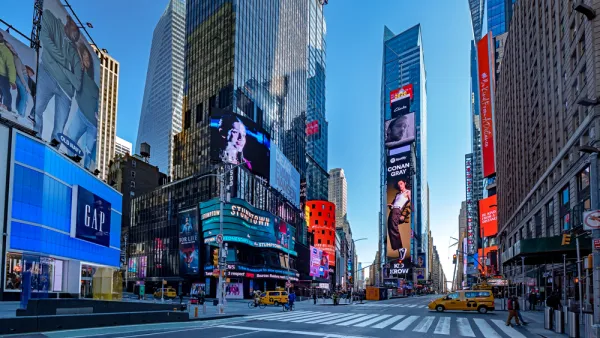The coronavirus crisis is highlighting the contributions of cities as well as their vulnerabilities and the planning issues that need to be priorities in the future.

"The impacts of the global COVID-19 pandemic are still being understood, but it does seem clear that this crisis will make a mark on cities, physically and socially, that will echo for generations," writes Rogier van den Berg.
While the pandemic has spurred debate about the role of density in the spread of the disease and efforts to contain it, urban density is needed for the provision of core services. "It’s the lack of access to essential services such as water, housing and health care, that has exacerbated the challenge of responding effectively to COVID-19 in many cities," says van den Berg.
Van den Berg also points out the clear need for access to affordable housing and public spaces and more holistic planning of green space. In addition, city and regional planning need to be better integrated, and more granular data needs to be part of post-coronavirus urban planning.
Cities will face many important questions in the future related to urban planning, says van den Berg. "Will we make cities more resilient to future crises? Will we make green and blue spaces front and center of our infrastructure investments? And will we seriously address the fact that it’s not just physically, but economically, socially and environmentally that cities are connected to their surrounding regions?"
FULL STORY: How Will COVID-19 Affect Urban Planning?

National Parks Layoffs Will Cause Communities to Lose Billions
Thousands of essential park workers were laid off this week, just before the busy spring break season.

Retro-silient?: America’s First “Eco-burb,” The Woodlands Turns 50
A master-planned community north of Houston offers lessons on green infrastructure and resilient design, but falls short of its founder’s lofty affordability and walkability goals.

Delivering for America Plan Will Downgrade Mail Service in at Least 49.5 Percent of Zip Codes
Republican and Democrat lawmakers criticize the plan for its disproportionate negative impact on rural communities.

Test News Post 1
This is a summary

Test News Headline 46
Test for the image on the front page.

Balancing Bombs and Butterflies: How the National Guard Protects a Rare Species
The National Guard at Fort Indiantown Gap uses GIS technology and land management strategies to balance military training with conservation efforts, ensuring the survival of the rare eastern regal fritillary butterfly.
Urban Design for Planners 1: Software Tools
This six-course series explores essential urban design concepts using open source software and equips planners with the tools they need to participate fully in the urban design process.
Planning for Universal Design
Learn the tools for implementing Universal Design in planning regulations.
EMC Planning Group, Inc.
Planetizen
Planetizen
Mpact (formerly Rail~Volution)
Great Falls Development Authority, Inc.
HUDs Office of Policy Development and Research
NYU Wagner Graduate School of Public Service





























